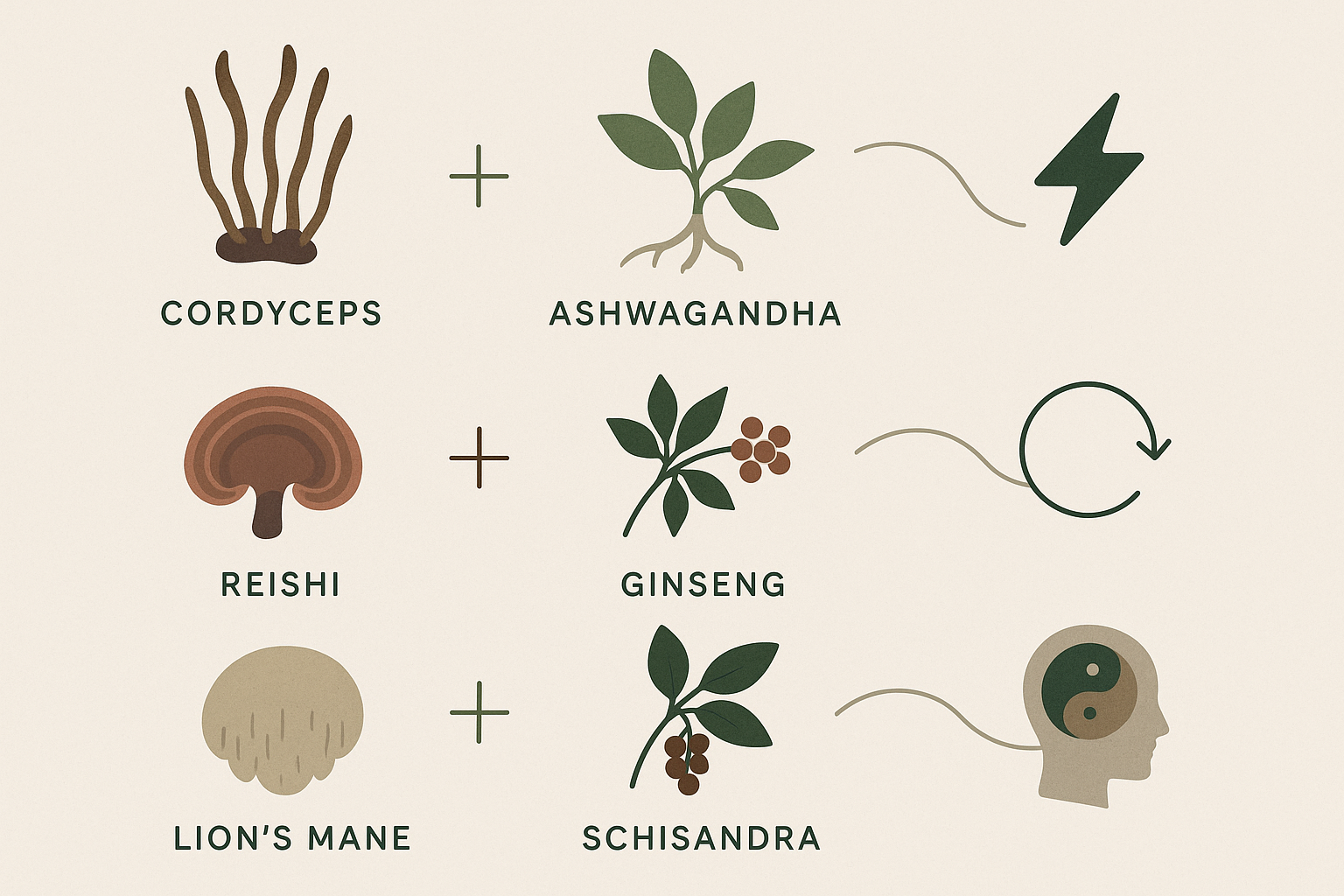In the growing world of natural wellness, adaptogenic mushrooms and powerful botanical herbs have carved out a prominent niche. These natural substances, long celebrated in traditional medicine systems like Ayurveda and Traditional Chinese Medicine, are gaining recognition for their scientifically supported roles in stress reduction, immunity, cognitive health, and physical performance. Among the many health benefits attributed to adaptogens, one area garnering particular attention is their influence on muscle function, recovery, and strength. As consumers look for alternatives to synthetic performance enhancers and harsh stimulants, many are turning toward evidence-based natural strategies. In this comprehensive exploration, we will delve into the proven benefits of adaptogenic mushrooms and uncover the best herbs for muscle strength, backed by credible science and traditional knowledge.
You may also like: Unlock Powerful Stress-Relief with Adaptogenic Mushrooms and Stamina Herbal Support

Understanding Adaptogens: Nature’s Balancers
Adaptogens are a unique class of non-toxic plants and fungi known for their ability to help the body adapt to stress and restore balance. Unlike stimulants or suppressants, adaptogens work by modulating the body’s stress response, supporting homeostasis across various biological systems. They are not single-target remedies; instead, adaptogens exhibit pleiotropic effects, meaning they influence multiple physiological pathways. This holistic nature makes them particularly valuable for enhancing resilience, energy, and recovery—all crucial elements for building muscle strength and endurance.
Adaptogenic mushrooms, in particular, have emerged as a fascinating category within this broader group. With centuries of medicinal use and modern clinical research to validate their properties, mushrooms such as Cordyceps, Reishi, Lion’s Mane, and Rhodiola rosea (a plant often grouped with mushroom-based adaptogens due to its similar stress-regulating properties) have become staples in the supplement industry. Their ability to regulate cortisol levels, enhance oxygen utilization, and improve mitochondrial function underscores their relevance in athletic and muscular performance.

Cordyceps: A Fungus for Strength and Stamina
Cordyceps militaris and Cordyceps sinensis have long been used in Tibetan and Chinese medicine for vitality and stamina. What sets Cordyceps apart in the realm of performance enhancement is its role in promoting adenosine triphosphate (ATP) production, which is the primary energy currency of cells. Increased ATP availability allows muscles to contract more efficiently, supporting enhanced physical performance and delayed fatigue. Studies have demonstrated that Cordyceps supplementation may increase VO2 max (a measure of aerobic capacity) and improve endurance during exercise.
Moreover, Cordyceps exhibits anti-inflammatory properties that can help reduce muscle soreness post-workout. Its bioactive compound, cordycepin, has been shown to suppress inflammatory cytokines and support the repair of muscle tissue. This dual-action—boosting energy and aiding recovery—makes Cordyceps a premier adaptogen for those seeking the best herbs for muscle strength.
Reishi Mushroom: The Calm Behind the Strength
While Reishi (Ganoderma lucidum) is traditionally known for its calming effects and immune-enhancing properties, its relevance to muscle strength should not be overlooked. Chronic stress is one of the most significant barriers to muscle development and performance. Elevated cortisol levels can lead to catabolic processes, where the body breaks down muscle tissue for energy. Reishi helps modulate the hypothalamic-pituitary-adrenal (HPA) axis, reducing stress hormone levels and creating a physiological environment conducive to muscle growth.
Additionally, Reishi’s rich antioxidant profile helps combat oxidative stress induced by intense physical activity. Free radicals generated during exercise can impair muscle recovery and contribute to fatigue. By reducing this oxidative burden, Reishi promotes faster recovery times and supports consistent training efforts—both of which are essential for long-term muscle development.

Lion’s Mane: Neural Support for Muscular Efficiency
Lion’s Mane (Hericium erinaceus) is most famous for its neurotrophic effects, particularly its ability to stimulate the production of nerve growth factor (NGF). While this property is typically associated with cognitive enhancement, it also plays a critical role in muscular coordination and control. Muscle strength is not merely a function of muscle size but also of neuromuscular efficiency. Improved communication between the nervous system and muscle fibers can lead to more effective contractions, better balance, and quicker reflexes.
Furthermore, Lion’s Mane has shown potential in reducing symptoms of anxiety and depression—psychological states that can interfere with physical performance. By enhancing both the mind and the body, Lion’s Mane serves as a holistic tool in the pursuit of physical vitality and strength.
Ashwagandha: Bridging Adaptogens and Muscle Power
Although not a mushroom, Ashwagandha (Withania somnifera) deserves special mention due to its profound adaptogenic and anabolic properties. It is often considered one of the best herbs for muscle strength because of its ability to simultaneously reduce cortisol levels and boost testosterone. This hormonal shift supports muscle protein synthesis, strength gains, and improved body composition.
Clinical studies have repeatedly shown that Ashwagandha supplementation can enhance maximal strength, reduce exercise-induced muscle damage, and increase muscle mass in both trained and untrained individuals. Its versatility also extends to improving cardiorespiratory endurance and enhancing overall vitality. Because of these multifaceted benefits, Ashwagandha acts as a bridge between traditional adaptogens and modern sports performance nutrition.

Best Herbs for Muscle Strength: Traditional Wisdom Meets Modern Science
When evaluating the best herbs for muscle strength, it is important to consider those with both anabolic (muscle-building) and adaptogenic properties. These herbs not only promote muscle growth but also support the physiological systems that underpin strength, such as hormonal balance, recovery capacity, and stress resilience.
One such herb is Ginseng, particularly Panax ginseng and its cousin Eleutherococcus senticosus (Siberian Ginseng). Ginseng has been shown to improve muscle strength and endurance by enhancing mitochondrial function and increasing nitric oxide production, which improves blood flow to muscles. This increased circulation facilitates better oxygen and nutrient delivery, supporting both performance and recovery.
Tribulus terrestris is another traditional herb that has garnered attention for its testosterone-boosting effects. While evidence is mixed regarding its direct impact on muscle hypertrophy, it may serve as a supportive herb for individuals with suboptimal androgen levels. Combined with resistance training and proper nutrition, Tribulus can potentially enhance the hormonal environment needed for muscle growth.
Schisandra chinensis is a lesser-known adaptogenic berry with remarkable effects on physical performance and endurance. It supports liver detoxification, stabilizes blood sugar levels, and improves oxygen utilization—all of which are critical for sustained muscular output. Schisandra also enhances mental alertness and reduces fatigue, making it a comprehensive aid for athletes and fitness enthusiasts.

Synergistic Effects of Adaptogens and Strength Herbs
While each herb and mushroom carries its own unique benefits, their true potential often emerges when used in synergy. Combining adaptogenic mushrooms like Cordyceps or Reishi with strength-promoting herbs such as Ashwagandha or Ginseng can produce a harmonized effect that supports both mental and physical performance. This approach aligns with traditional holistic medicine philosophies, which emphasize the interconnectedness of the body’s systems.
For example, pairing Cordyceps with Ashwagandha may amplify ATP production while simultaneously lowering cortisol, creating an ideal environment for high-intensity performance and rapid recovery. Similarly, a blend of Lion’s Mane and Panax Ginseng can optimize neuromuscular function and focus, leading to more effective training sessions. These combinations are now being used in many high-quality performance supplements aimed at providing a comprehensive advantage without the side effects of synthetic drugs.
Navigating Quality and Dosage: What to Look For
The effectiveness of adaptogenic mushrooms and herbs depends heavily on their quality, sourcing, and dosage. Many commercial supplements use subtherapeutic doses or inferior raw materials, compromising efficacy. When selecting a product, it is important to choose brands that use standardized extracts, third-party testing, and full-spectrum formulations. For mushrooms, the presence of fruiting body extracts (rather than just mycelium on grain) typically indicates higher levels of active compounds like beta-glucans and cordycepin.
Dosing can vary widely depending on the herb or mushroom and the intended goal. For instance, effective dosages for Ashwagandha typically range from 300 to 600 mg of a standardized root extract, while Cordyceps extracts are often used in the range of 1,000 to 3,000 mg daily. It’s advisable to consult with a healthcare provider, particularly for individuals with existing health conditions or those taking medications, to ensure safety and optimal outcomes.

Hormonal Balance and Its Impact on Strength
An often-overlooked factor in the muscle-strengthening equation is hormonal balance. Testosterone, growth hormone, cortisol, and insulin all play crucial roles in regulating muscle metabolism. The best herbs for muscle strength often influence one or more of these hormonal pathways. Ashwagandha, for example, not only boosts testosterone but also modulates cortisol, offering a dual advantage. Likewise, Ginseng can influence insulin sensitivity, enhancing nutrient uptake and recovery.
A balanced hormonal environment ensures that anabolic processes (such as muscle repair and growth) outpace catabolic ones (such as muscle breakdown). Herbs that stabilize the HPA axis and optimize endocrine function enable more consistent training performance and better adaptation to physical stress. This hormonal harmony is particularly important for aging individuals, whose natural hormone levels may decline with time.
Metabolic Efficiency and Mitochondrial Support
Building muscle requires not just lifting weights but also efficient energy production at the cellular level. Mitochondria, the energy-producing organelles within our cells, are pivotal in converting nutrients into usable energy. Many adaptogenic herbs and mushrooms enhance mitochondrial function, making them indirectly but powerfully supportive of muscle strength.
Cordyceps and Rhodiola, in particular, are known to stimulate mitochondrial biogenesis—the creation of new mitochondria. This adaptation leads to better endurance, faster recovery, and increased work capacity. Improved mitochondrial efficiency also means reduced lactic acid buildup, a common culprit in muscle fatigue. Thus, adaptogens play an indispensable role in supporting the metabolic demands of muscle training.
The Role of Sleep and Recovery in Muscle Building
No discussion of muscle strength is complete without acknowledging the critical importance of sleep and recovery. Muscles do not grow during training but in the hours afterward, particularly during deep sleep when growth hormone secretion peaks. Adaptogens that enhance sleep quality indirectly support muscular development by allowing the body to enter a more anabolic state during rest.
Reishi and Ashwagandha are both known for their sleep-enhancing effects. Reishi promotes relaxation through its interaction with the GABAergic system, while Ashwagandha supports the regulation of circadian rhythms. Improved sleep quality leads to better mood, more energy for training, and more efficient muscle repair.
Digestive Health and Nutrient Absorption
Another foundational element of muscle health is nutrient absorption. The body requires amino acids, vitamins, and minerals in optimal quantities to support protein synthesis, repair damaged tissues, and fuel muscular activity. If the digestive system is compromised, even the best diet and supplement plan can fall short.
Herbs like Ginger, Turmeric, and Licorice root support digestive function by reducing inflammation, enhancing enzyme activity, and protecting the gut lining. These herbs, while not traditionally classified as adaptogens, play a supportive role in creating the internal environment needed for muscular strength. They complement the actions of adaptogens and can be particularly beneficial when used alongside them in well-rounded formulations.
Mental Resilience and Motivation
Muscle strength is not merely a matter of physical capability—it also requires consistent motivation, mental discipline, and emotional resilience. The psychological benefits of adaptogens cannot be overstated in this regard. Adaptogens such as Rhodiola rosea and Lion’s Mane enhance mental stamina, reduce the perception of fatigue, and elevate mood—all of which contribute to better workout adherence and performance.
Rhodiola, in particular, is known for its ability to reduce symptoms of burnout and elevate energy levels without overstimulation. This makes it ideal for individuals experiencing training plateaus or motivational dips. By supporting both the mind and the body, adaptogens provide a comprehensive approach to sustained progress in strength training.
How to Integrate Adaptogens Into Your Routine
Adopting adaptogens into your wellness regimen requires consistency and mindfulness. These herbs and mushrooms are not magic pills—they work best over time as part of a holistic lifestyle that includes proper nutrition, exercise, stress management, and sleep. Start with one or two adaptogens based on your individual needs. For instance, if you’re looking for the best herbs for muscle strength with an emphasis on energy and endurance, Cordyceps and Ashwagandha make a strong pair.
Adaptogens can be consumed as capsules, powders, teas, or tinctures. Powders offer flexibility and are often more economical, while capsules provide convenience and dosage precision. Teas and tinctures may offer faster absorption but require more preparation. Choose a delivery format that fits your lifestyle to encourage consistent use.
Frequently Asked Questions: Adaptogens, Herbal Performance, and Muscle Optimization
How long does it typically take to see results from adaptogenic mushrooms and herbs?
While the timeline for noticeable results can vary depending on individual physiology and lifestyle, most people begin to observe subtle improvements within two to four weeks of consistent use. Adaptogens like Cordyceps and Ashwagandha work cumulatively rather than immediately, building resilience and supporting muscle performance through gradual regulation of stress and energy systems. If your goal is enhanced recovery or increased stamina, the effects may appear sooner due to improved mitochondrial function and stress adaptation. For those seeking long-term muscular development or hormonal support, results may become more pronounced after eight to twelve weeks. It’s also crucial to pair these supplements with balanced nutrition, adequate sleep, and a structured training regimen for optimal and sustained outcomes.
What makes the best herbs for muscle strength different from synthetic performance enhancers?
The best herbs for muscle strength offer holistic benefits without the hormonal disruption or potential toxicity often associated with synthetic enhancers. Unlike anabolic steroids or pharmaceutical stimulants that may target a single hormonal pathway, herbs like Ashwagandha, Panax Ginseng, and Schisandra provide a more comprehensive system-wide effect. They not only support anabolic processes like protein synthesis but also optimize stress regulation, cardiovascular health, and neuroendocrine balance. This makes them suitable for long-term use without the common rebound or dependency effects seen with artificial substances. In addition, these herbs often enhance recovery, mental focus, and immune function—areas that synthetic options tend to neglect or even compromise.
Are there any adaptogenic mushrooms that specifically support aging muscles?
Yes, several adaptogenic mushrooms show promise in addressing the muscular and metabolic shifts that occur with aging. Reishi mushroom, for instance, offers anti-inflammatory benefits that help counteract age-related muscle wasting and joint discomfort. Cordyceps has been studied for its ability to increase ATP production and oxygen efficiency, two factors that tend to decline with age. Lion’s Mane adds value by supporting neuromuscular coordination, which is critical for balance, reflexes, and mobility in older adults. Regular supplementation, especially when combined with resistance training and sufficient protein intake, may mitigate sarcopenia and enhance functional strength well into advanced age. These mushrooms also support better sleep and mood stability, which can indirectly influence motivation and physical consistency.
Can you combine the best herbs for muscle growth with conventional supplements like protein or creatine?
Absolutely—herbal and conventional supplements can be complementary when used thoughtfully. Many of the best herbs for muscle growth, such as Ashwagandha or Eleuthero, support hormonal and metabolic functions that enhance the body’s responsiveness to resistance training. When combined with foundational supplements like whey protein or creatine monohydrate, the effects can be synergistic. For example, improved testosterone balance from herbs may support greater gains in muscle mass when paired with creatine-fueled strength output. Timing and dosing are essential, however; adaptogens are typically taken in the morning or post-exercise, while protein and creatine protocols often revolve around training windows. Consultation with a healthcare provider or sports nutritionist can help customize your stack for safety and efficacy.
What role does mental clarity play in strength training, and how can adaptogens help?
Mental clarity is crucial in strength training, especially when performing complex movements that require coordination, balance, and focus. Herbs such as Rhodiola rosea and Lion’s Mane enhance cognitive sharpness and reduce mental fatigue, helping athletes maintain proper form and decision-making under physical stress. This is particularly valuable during high-volume or high-intensity workouts where mental lapses can lead to injury or diminished performance. Moreover, improved motivation and emotional stability can lead to more consistent training, which is essential for long-term muscle development. Many of the best herbs for muscle strength offer dual benefits by supporting both neurological and physical resilience, making them ideal for athletes seeking comprehensive performance enhancement.
Do the best herbs for muscle strength support women’s fitness goals, or are they more male-focused?
While certain herbs like Tribulus terrestris are often marketed toward men due to their testosterone-boosting potential, many of the best herbs for muscle strength provide universal benefits that apply equally to women. Ashwagandha, for example, supports cortisol regulation and muscle recovery in both genders, while Cordyceps improves energy metabolism and oxygen utilization across the board. Schisandra and Rhodiola are particularly well-suited to women as they aid in hormone balance, endurance, and stress resilience without disrupting estrogenic pathways. These herbs can be used by women aiming for toned physiques, improved stamina, or faster recovery, and are generally considered safe when dosed appropriately. It’s always wise for women to choose formulations designed with female physiology in mind, especially when combining multiple herbs.
How do adaptogens compare to nootropics in enhancing performance and muscle growth?
Adaptogens and nootropics both enhance performance but act through different mechanisms. Nootropics primarily focus on cognitive enhancement, including memory, attention, and mental clarity. Adaptogens, on the other hand, target the body’s stress response and energy systems, making them more holistic in their effect. However, there is some crossover—Lion’s Mane is both an adaptogen and a nootropic, supporting brain function and neuromuscular coordination. For muscle growth and strength, adaptogens offer a more direct physiological advantage through hormonal support, mitochondrial enhancement, and inflammation control. Nootropics may still play a supporting role by improving workout focus and mental endurance, especially when used in conjunction with the best herbs for muscle growth.
Are there any common mistakes people make when using the best herbs for muscle growth?
Yes, several common mistakes can limit the effectiveness of these herbs. One major error is expecting instant results; unlike stimulants, most herbs require consistent use over time to yield significant benefits. Another mistake is underdosing—many commercial products contain subclinical amounts of active ingredients, making it critical to choose reputable brands with standardized extracts. People also sometimes neglect synergy; combining herbs like Ashwagandha and Cordyceps can produce a stronger effect than using either alone, especially for those pursuing comprehensive gains in performance and recovery. Lastly, ignoring individual responses and not cycling herbs periodically can lead to diminished sensitivity or unexpected side effects. Personalizing your approach and tracking your body’s response can help optimize results safely.
What are the long-term health implications of using strength-enhancing adaptogens regularly?
Long-term use of adaptogens, when monitored and used appropriately, generally supports overall wellness rather than posing risk. Unlike synthetic agents, the best herbs for muscle strength typically do not suppress endogenous hormone production or damage organs when used in recommended doses. In fact, many adaptogens contribute to long-term health by reducing chronic inflammation, improving sleep quality, and balancing hormones—all of which play roles in aging and disease prevention. However, the body’s needs may change over time, and regular use should be periodically reassessed. Rotating between different adaptogens and taking occasional breaks can preserve sensitivity and ensure that you are meeting your body’s current demands without over-reliance on any single supplement.
Emerging Research: What’s Next for the Best Herbs for Muscle Strength?
Emerging research is exploring the genomic and microbiome-modulating effects of many of the best herbs for muscle strength. For instance, preliminary studies indicate that Ashwagandha may influence gene expression related to muscle repair, while Cordyceps may alter gut flora in ways that improve nutrient absorption and energy metabolism. Scientists are also investigating the adaptogenic synergy with peptides and plant-based proteins for enhanced anabolic response. Personalized medicine may soon offer tailored adaptogen regimens based on genetic or hormonal profiles, optimizing results for individual users. As interest grows in plant-based performance enhancement, the future promises not only greater validation but also more sophisticated applications of these time-honored herbs in the muscle-building space.
Conclusion: Harnessing the Synergy of Nature for Strength and Resilience
In a world filled with quick fixes and synthetic shortcuts, the enduring wisdom of natural adaptogens and strength-enhancing herbs offers a refreshing, science-backed alternative. By targeting the root causes of fatigue, hormonal imbalance, inflammation, and stress, these powerful botanical allies create the internal conditions necessary for true muscular strength to flourish. As the scientific understanding of adaptogenic mushrooms and herbal medicine deepens, we continue to discover how profoundly interconnected our physical and emotional states really are. Through informed choices and mindful integration of nature’s most effective tools, we can build not just stronger bodies but more resilient lives.
Further Reading:
Eco-Friendly Supplements Pure and Planet Friendly
Ayurvedic Superfoods for Muscle Gain
Elevate Your Athletic Edge with Natural Herbs for Muscle Growth and Sport Performance
